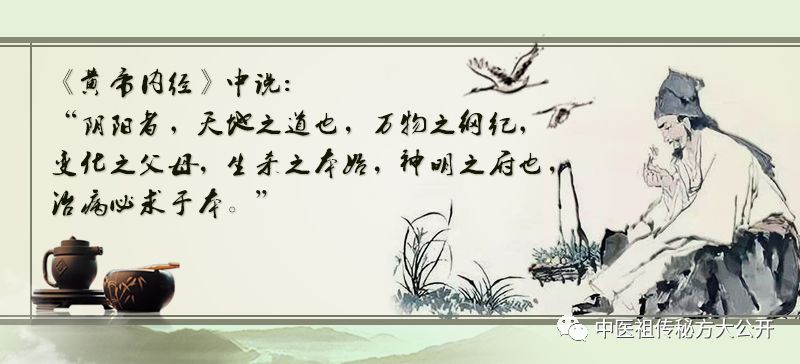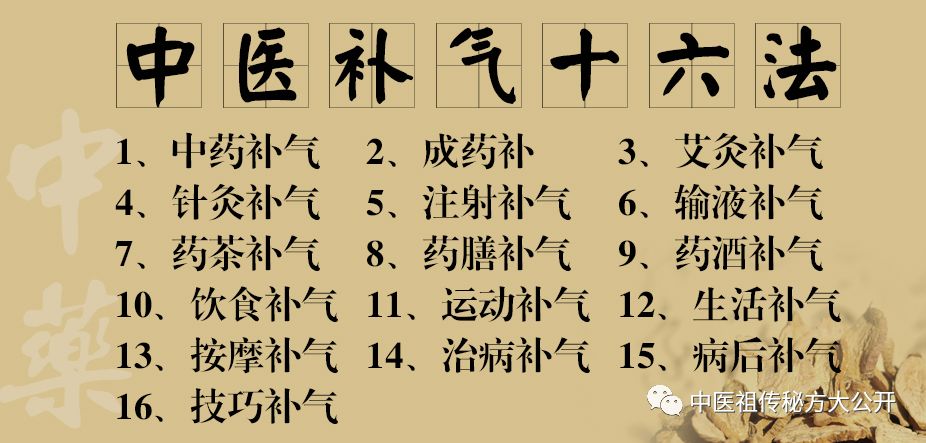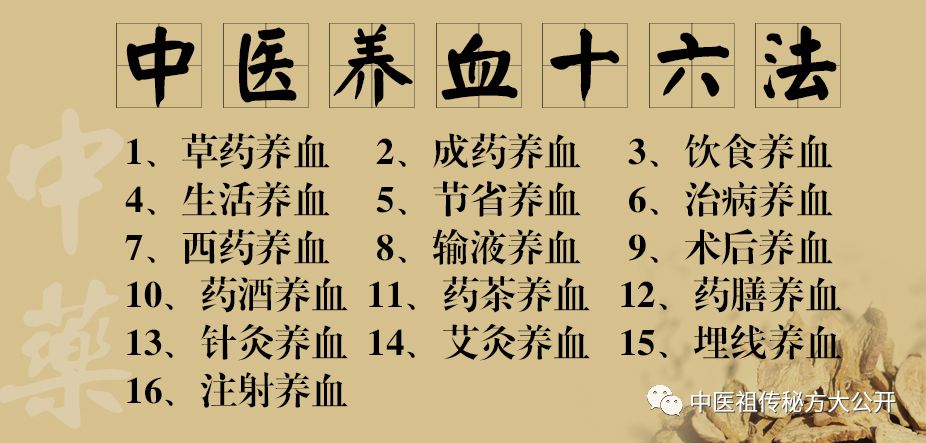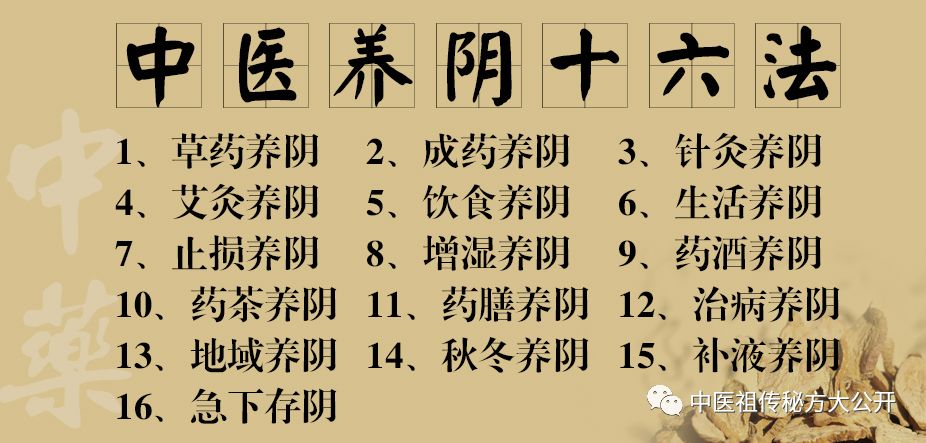In recent years, many people have asked me: What is the most important aspect of health preservation? My answer is four words: Yin-Yang Balance.

Everything in the world can ultimately be divided into two categories: one is Yin, and the other is Yang. Yin and Yang are two opposing energies; one is positive and the other negative, one is left and the other right, one is up and the other down, one is front and the other back, mutually restraining and interdependent. It is precisely because Yin and Yang are opposing yet interdependent that we have heaven and earth, sun and moon, and male and female.
Although the human body is complex, it fundamentally consists of only two types of energy: one is Yin, and the other is Yang. The continuous changes of these two energies give rise to life, aging, illness, and death.
The Huangdi Neijing states: “Yin and Yang are the principles of heaven and earth, the framework of all things, the parents of change, the source of life and death, and the abode of spirit. To treat illness, one must seek the root.” This extensive text of the Huangdi Neijing, comprising over a hundred thousand words, essentially discusses Yin and Yang.

A person’s life is inseparable from birth, aging, illness, and death. What is life? Life is the temporary unity of Yin and Yang energies within the body. What is aging? Aging is the continuous change and decline of Yin and Yang within the body. What is illness? Illness is the imbalance of Yin and Yang energies within the body. What is death? Death is the disintegration of this unity of Yin and Yang.
What is life? Life is a balanced state formed by the contradictory energies of Yin and Yang, where the positive pole is Yang and the negative pole is Yin. Only with Yin-Yang Balance can a person exist. The Huangdi Neijing states, “The root of life is based on Yin and Yang.” In the universe, heaven above represents Yang, earth below represents Yin, and humans in between pursue Yin-Yang balance. Therefore, life is a state of neither too high nor too low, a state of Yin-Yang balance. If this balance is completely disrupted, life will end. What happens after life ends? It is the separation of Yin and Yang. At the crematorium, one can observe this phenomenon of Yin and Yang separation: the Yang energy transforms into wisps of smoke drifting into the sky, while the Yin energy becomes ashes buried underground. A person, with their head under the blue sky and feet on the yellow earth, thus disappears from the world.
Life is a state of internal stability, and this stability depends on the balance of Yin and Yang. Yin and Yang are like the two weights on a balance scale; only when they are equal does the scale remain stable. Once Yin and Yang are imbalanced, the scale tilts to one side, breaking the balance, and the person becomes ill. Therefore, to achieve long-term health, one must constantly maintain the balance of Yin and Yang. What is health preservation? It is the nurturing of Yin and Yang; only with harmonious Yin and Yang can we live a life free from illness.
Sixteen Methods for Nourishing Qi in Traditional Chinese Medicine

1. Herbal Qi Nourishment: Huang Qi (Astragalus), Ren Shen (Ginseng), Dang Shen (Codonopsis), Tai Zi Shen (Pseudostellaria), Huang Jing (Polygonatum), Xi Yang Shen (American Ginseng), Bai Zhu (White Atractylodes), etc.
2. Patent Medicine Qi Nourishment: Bu Zhong Yi Qi Wan (Tonify the Middle and Augment the Qi Pill), Shi Quan Da Bu Gao (All-Inclusive Great Tonifying Ointment), Gui Pi Wan (Restore the Spleen Pill), Shen Ling Bai Zhu Wan (Ginseng and Atractylodes Pill), etc.
3. Moxibustion for Qi Nourishment: Zu San Li (St36), Shen Que (Ren8), Guan Yuan (Ren4), Pi Shu (Bl20), Qi Hai (Ren6), Bai Hui (Du20), Fei Shu (Bl13), etc.
4. Acupuncture for Qi Nourishment: Zu San Li (St36), Bai Hui (Du20), San Yin Jiao (Sp6), Qi Hai (Ren6), Guan Yuan (Ren4), Pi Shu (Bl20), Fei Shu (Bl13), etc.
5. Injection for Qi Nourishment: Huang Qi injection at Zu San Li (St36). Placenta injection at San Yin Jiao (Sp6), etc.
6. Infusion for Qi Nourishment: Huang Qi injection, Ren Mai injection, Dan Shen injection, etc.
7. Herbal Tea for Qi Nourishment: Ren Shen Ling Zhi Tea (Ginseng and Reishi Tea), Huang Qi Goji Tea (Astragalus and Goji Tea), Xi Yang Shen Mai Dong Tea (American Ginseng and Ophiopogon Tea), etc.
8. Medicinal Cuisine for Qi Nourishment: Huang Qi Xin Fei Soup (Astragalus and Lung Soup), Ren Shen Stewed Chicken (Ginseng Stewed Chicken), Dang Shen Stewed Pork Ribs (Codonopsis Stewed Pork Ribs), etc.
9. Medicinal Wine for Qi Nourishment: Huang Qi, Ren Shen, Ling Zhi, Mai Dong, Goji soaked in wine.
10. Dietary Qi Nourishment: Sea cucumber, eggs, red dates, sheep and cow placenta, Qian Shi (Euryale), Shan Yao (Chinese Yam), Lian Zi (Lotus Seed), etc.
11. Exercise for Qi Nourishment: Qigong, Tai Chi, Dao Yin, martial arts, fitness exercises, appropriate activities, etc.
12. Lifestyle for Qi Nourishment: Regular daily routine, balance between work and rest, maintaining a balanced mindset, etc.
13. Massage for Qi Nourishment: Massage Zu San Li (St36), Guan Yuan (Ren4), abdominal massage, spine kneading, etc.
14. Illness Treatment for Qi Nourishment: Treat illnesses early and thoroughly, do not delay, prevent chronic illness from depleting Qi.
15. Post-Illness Qi Nourishment: After major illnesses or surgeries, postpartum, one should timely adjust and replenish Qi and blood to prevent Qi deficiency.
16. Techniques for Qi Nourishment: Breathing exercises, focusing on the Dantian, moderate hunger and cold, moderation in all things, etc.
Sixteen Methods for Nourishing Blood in Traditional Chinese Medicine

1. Herbal Blood Nourishment: Dang Gui (Angelica), He Shou Wu (Fo-Ti), E Jiao (Donkey-hide Gelatin), Shu Di Huang (Rehmannia), Goji Berries, Huang Qi (Astragalus), etc.
2. Patent Medicine Blood Nourishment: Shi Quan Da Bu Gao (All-Inclusive Great Tonifying Ointment), Gui Pi Wan (Restore the Spleen Pill), Fu Fang E Jiao Jiang (Compound Donkey-hide Gelatin Syrup), Dang Gui Bu Xue Gao (Angelica Blood Nourishing Ointment), etc.
3. Dietary Blood Nourishment: Longan, old hen, red dates, egg yolk, pig liver, lean meat, fish, etc.
4. Lifestyle Blood Nourishment: Regular lifestyle, balance between work and rest, balanced nutrition, cooking with iron pots, avoiding strong tea.
5. Conservation Blood Nourishment: Avoid prolonged viewing, excessive thinking, overwork, and external injuries causing blood loss.
6. Illness Treatment Blood Nourishment: Prevent and treat bleeding, kidney failure, aplastic anemia, excessive menstruation, and other diseases.
7. Western Medicine Blood Nourishment: Vitamin C, Vitamin B12, ferrous fumarate, etc.
8. Infusion Blood Nourishment: Plasma, whole blood, Ren Mai injection, etc.
9. Post-Surgery Blood Nourishment: After major and minor surgeries, postpartum, and after abortion, one should nourish Qi and blood.
10. Medicinal Wine Blood Nourishment: Huang Qi, Dang Gui, Ren Shen, He Shou Wu, Goji soaked in wine.
11. Herbal Tea Blood Nourishment: Dang Gui Longan Tea (Angelica and Longan Tea), Goji Black Sesame Tea, Suan Zao Ren Tea (Sour Jujube Seed Tea), etc.
12. Medicinal Cuisine Blood Nourishment: Huang Qi Dang Gui Stewed Old Hen (Astragalus and Angelica Stewed Old Hen), Dang Gui Lamb Soup (Angelica Lamb Soup), etc.
13. Acupuncture Blood Nourishment: Zu San Li (St36), San Yin Jiao (Sp6), Pi Shu (Bl20), Xue Hai (Sp10), Ge Shu (Bl17), etc.
14. Moxibustion Blood Nourishment: Zu San Li (St36), San Yin Jiao (Sp6), Shen Que (Ren8), Zhong Wan (Ren12), Xue Hai (Sp10), etc.
15. Thread Embedding Blood Nourishment: Zu San Li (St36), Shen Shu (Bl23), Pi Shu (Bl20), Gan Shu (Bl18), etc.
16. Injection Blood Nourishment: Placenta, Dang Gui, Huang Qi, B12 injections at Zu San Li (St36), San Yin Jiao (Sp6), etc.
Sixteen Methods for Nourishing Yin in Traditional Chinese Medicine

1. Herbal Yin Nourishment: Mai Dong (Ophiopogon), Sha Shen (Adenophora), Shi Hu (Dendrobium), Yu Zhu (Polygonatum), Tian Dong (Asparagus), Shan Zhu Yu (Cornus), etc.
2. Patent Medicine Yin Nourishment: Liu Wei Di Huang Wan (Six-Ingredient Rehmannia Pill), Mai Wei Di Huang Wan (Ophiopogon Rehmannia Pill), Yang Yin Qing Fei Wan (Nourish Yin and Clear Lung Pill), etc.
3. Acupuncture for Yin Nourishment: Tai Xi (Kidney 3), Zhao Hai (Kidney 6), San Yin Jiao (Sp6), Shen Shu (Bl23), etc.
4. Moxibustion for Yin Nourishment: San Yin Jiao (Sp6), Shen Shu (Bl23), Gan Shu (Bl18), etc.
5. Dietary Yin Nourishment: Autumn pears, honey, vegetables and fruits, lily, white fungus, etc.
6. Lifestyle Yin Nourishment: Tapping teeth and swallowing saliva, rubbing Yong Quan (Kidney 1), keeping warm, using air conditioning, and drinking more.
7. Damage Control for Yin Nourishment: Reduce sunflower seed consumption, avoid wind exposure and sun exposure, quit smoking, and moderate sexual activity.
8. Moisture Addition for Yin Nourishment: Hang wet towels and clothes indoors, place water basins indoors, use humidifiers, etc.
9. Medicinal Wine for Yin Nourishment: Mai Dong, Bai He (Lily), Shi Hu, Shu Di Huang, Shan Zhu Yu soaked in wine.
10. Herbal Tea for Yin Nourishment: Bai He, Mai Dong, Tian Dong, Sha Shen, Yu Zhu soaked in tea.
11. Medicinal Cuisine for Yin Nourishment: White Fungus and Lily Soup, Goji Stewed Soft-Shelled Turtle, Black Sesame Oil, etc.
12. Illness Treatment for Yin Nourishment: Diabetes, hyperthyroidism, recurrent heat, menopausal syndrome, etc., all require Yin nourishment.
13. Regional Yin Nourishment: The dryness of the northwest easily damages Yin, while the humidity of the southeast can reduce moisture evaporation and protect Yin.
14. Autumn and Winter Yin Nourishment: The dry climate in autumn and winter leads to excessive moisture evaporation, so one should nourish Yin, protect Yin, and store essence.
15. Fluid Supplementation for Yin Nourishment: In acute illnesses with dehydration, dry mouth, and reduced urination, infusion can quickly improve the condition.
16. Emergency Yin Preservation: In TCM treatment of warm diseases, using laxatives to reduce fever protects Yin and prevents true Yin deficiency.
Sixteen Methods for Nourishing Yang in Traditional Chinese Medicine

1. Herbal Yang Nourishment: Ren Shen (Ginseng), Fu Zi (Aconite), Rou Gui (Cinnamon), Ba Ji Tian (Morinda), Cong Rong (Cistanche), Lu Rong (Deer Antler), Gui Zhi (Cinnamon Twig), etc.
2. Patent Medicine Yang Nourishment: Jin Gui Shen Qi Wan (Kidney Qi Pill), Fu Zi Li Zhong Wan (Aconite and Ginseng Pill), Ai Fu Nuan Gong Wan (Mugwort and Aconite Womb-Warming Pill), etc.
3. Acupuncture for Yang Nourishment: Qi Hai (Ren6), Guan Yuan (Ren4), Zu San Li (St36), Bai Hui (Du20), Ming Men (Du4), etc.
4. Moxibustion for Yang Nourishment: Shen Que (Ren8), Guan Yuan (Ren4), Qi Hai (Ren6), Da Zhui (Du14), Ming Men (Du4), Yong Quan (Kidney 1), etc.
5. Dietary Yang Nourishment: Beef, lamb, dog meat, scallions, ginger, longan, sparrow eggs, deer meat, leeks, etc.
6. Exercise for Yang Nourishment: Qigong, Tai Chi, labor exercises, athletics, martial arts, and other activities that generate Yang.
7. Bathing for Yang Nourishment: Use of Chuan Wu (Aconite), Bu Guo Zhi (Psoralea), Gui Zhi (Cinnamon Twig), Fu Zi (Aconite), Gan Jiang (Dried Ginger) in baths.
8. Illness Treatment for Yang Preservation: Prevent and treat dysmenorrhea, chronic bronchitis, hypothyroidism, rheumatism, chronic diarrhea, and other cold diseases.
9. Cold Prevention for Yang Preservation: Avoid excessive cold exposure, personal protection, warmth, and reduce Yang energy loss.
10. Fire Kang for Yang Nourishment: Sleeping on a heated kang is beneficial for those with a cold constitution and the elderly.
11. Medicinal Wine for Yang Nourishment: Ginseng, Rou Cong Rong (Cistanche), Ba Ji Tian, Lu Rong (Deer Antler) soaked in wine can nourish Yang.
12. Medicinal Cuisine for Yang Nourishment: Ginseng, Dang Gui, Huang Qi stewed old hen, Dang Gui and Fu Zi lamb soup, etc.
13. Herbal Tea for Yang Nourishment: Ginseng tea, ginger black tea, goji tea, Cistanche tea, etc.
14. Point Application for Yang Nourishment: San Yin Jiao (Sp6) for chronic bronchitis, Bai Hu Jiao (Ren8) for prostatitis, moxibustion, etc.
15. Cupping for Yang Nourishment: Da Zhui (Du14), Shen Que (Ren8), Ming Men (Du4), Fei Shu (Bl13) for cupping to dispel cold and preserve Yang.
16. Spring and Summer Yang Preservation: In spring and summer, Yang is on the surface of the body, while internal organs may lack Yang energy, so one must prevent cold from affecting Yang.

